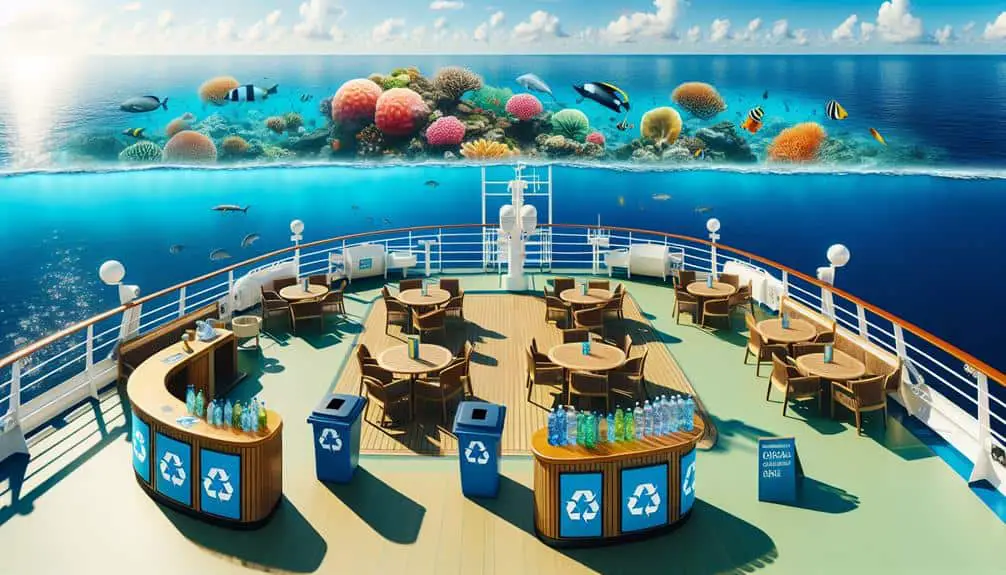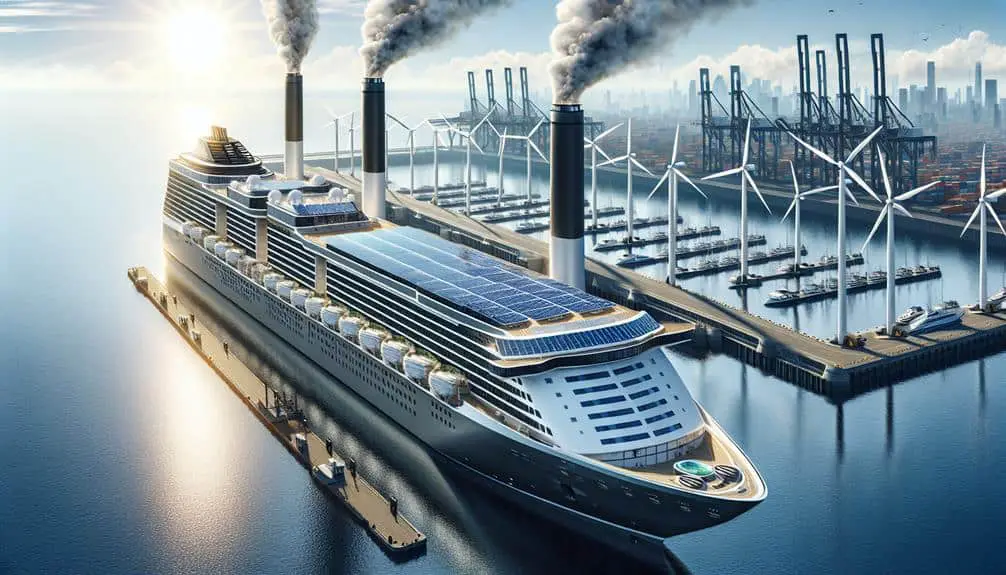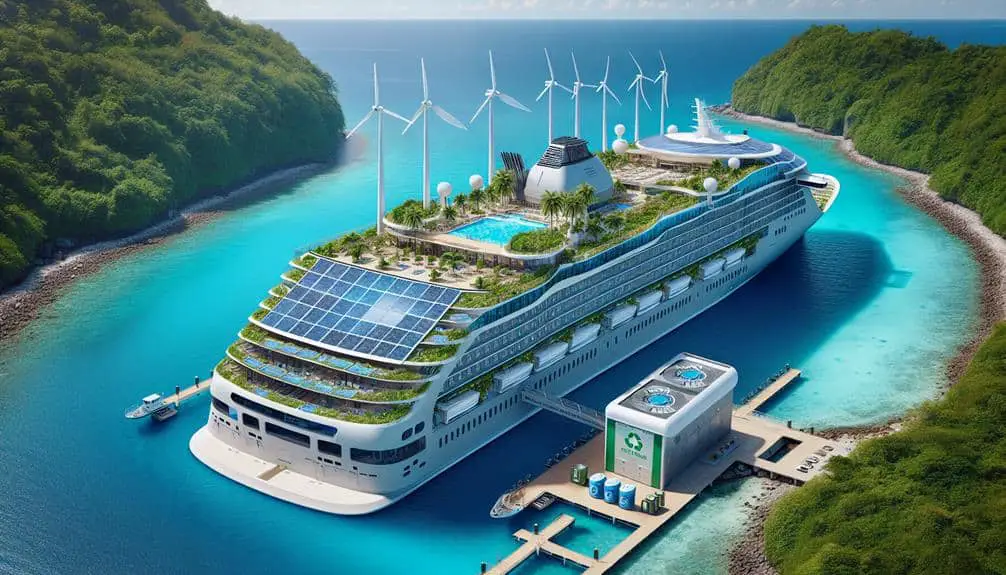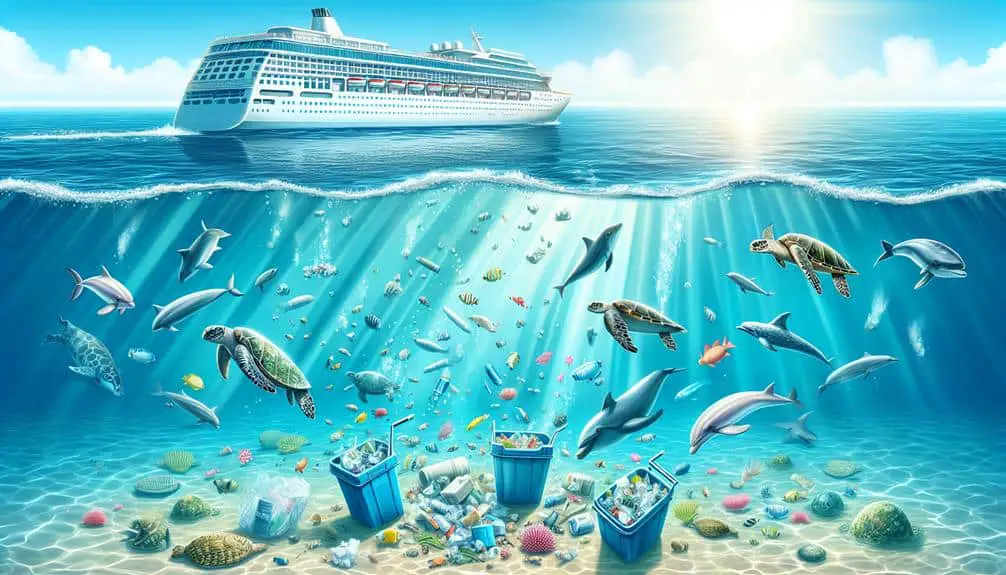Preserving marine wildlife on cruise ships requires careful waste management to prevent harm to ecosystems. Reduce pollution with proper waste disposal and advanced treatment systems. Protect delicate habitats by avoiding anchor dropping on coral reefs. Support marine sanctuaries and species protection programs. Minimize single-use plastics and promote recycling onboard. Collaborate with local communities for beach cleanups and conservation efforts. Learn more about mitigating cruise ship impact on marine wildlife by exploring detailed measures from waste reduction to wildlife conservation and community engagement initiatives.
Key Points
- Implement marine sanctuaries to protect sensitive species.
- Engage in species protection programs for endangered marine life.
- Conduct research and monitoring initiatives to understand wildlife behavior.
- Educate passengers through onboard programs on marine conservation.
- Minimize impact on marine ecosystems through conservation measures.
Impact of Cruise Ship Activities
Cruise ship activities, such as waste disposal, anchor dropping, and underwater noise pollution, have a significant impact on marine wildlife and their habitats. These actions result in negative effects that pose significant environmental harm.
Improper waste disposal, including plastic pollution and untreated sewage, can contaminate the waters where marine animals live and feed. This pollution not only affects the health of individual species but can also disrupt entire ecosystems.
Anchor dropping can damage delicate coral reefs, which serve as essential habitats for a diverse range of marine life.
The loud noises produced by cruise ships underwater can interfere with the communication, navigation, and feeding patterns of marine animals such as whales and dolphins. This disturbance can lead to stress, hearing loss, and even abandonment of critical habitats.
Understanding the full scope of these impacts is important in mitigating the harm caused by cruise ship activities and preserving the delicate balance of marine ecosystems.
Measures to Reduce Pollution
Implementing effective waste management strategies is essential in reducing pollution from cruise ship activities and safeguarding marine wildlife and their habitats. Sustainable practices are pivotal in minimizing the environmental impact of cruise ships. One key measure is the adoption of advanced wastewater treatment systems to make certain that only clean water is discharged back into the ocean.
Additionally, utilizing low-sulfur fuels and implementing exhaust gas cleaning systems can greatly reduce air pollution from cruise ship operations. Proper management of solid waste is also important, with recycling programs onboard and the reduction of single-use plastics playing a substantial role in pollution prevention.
Cruise lines can further mitigate their impact by monitoring fuel consumption to optimize efficiency and reduce greenhouse gas emissions. Implementing strict protocols for the disposal of hazardous materials and regular maintenance of ship equipment are crucial practices in pollution prevention. By adhering to these sustainable practices, cruise ships can minimize their pollution footprint and contribute to the conservation of marine wildlife and their habitats.
Wildlife Conservation Efforts
Efforts to safeguard marine wildlife on cruise ships involve enacting rigorous conservation measures to protect vulnerable species and their habitats. Cruise lines are increasingly focusing on wildlife conservation efforts to minimize their impact on the delicate marine ecosystems.
Here are some key strategies employed to protect marine wildlife:
- Establishment of Marine Sanctuaries: Cruise operators collaborate with conservation organizations to identify and designate marine sanctuaries where sensitive species can thrive undisturbed.
- Species Protection Programs: Cruise ships participate in species protection programs aimed at safeguarding endangered marine animals such as sea turtles, whales, and dolphins.
- Research and Monitoring Initiatives: Cruise lines support research projects and monitoring initiatives to better understand the behavior and migration patterns of marine wildlife.
- Educational Outreach: Implementing educational programs onboard to raise awareness among passengers about the importance of marine conservation and the need to protect vulnerable species.
Responsible Waste Management
With a focus on sustainability and environmental protection, the management of waste on marine vessels plays an important role in preserving the delicate ecosystems of the oceans. Waste reduction is a key aspect of responsible waste management on cruise ships. Implementing strategies to minimize waste generation, such as reducing single-use plastics and excess packaging, is essential in mitigating the environmental impact of cruise activities.
Recycling programs are necessary for guaranteeing that waste materials are properly managed on board. Separating recyclables like glass, paper, plastic, and aluminum allows for these materials to be processed and reused, decreasing the amount of waste that ends up in landfills or oceans. Cruise lines should work closely with recycling facilities to make sure that collected materials are effectively recycled.
Community Engagement Initiatives
To enhance the preservation of marine wildlife on cruise ships, engaging with local communities through collaborative initiatives can greatly contribute to environmental conservation efforts. Community engagement can take various forms, including:
- Stakeholder Partnerships: Establishing partnerships with local organizations, governments, and businesses can create a network of support for marine conservation efforts. By working together, cruise ships and local stakeholders can implement sustainable practices and policies that benefit marine wildlife.
- Educational Programs: Hosting educational programs for both passengers and local community members can raise awareness about marine wildlife conservation. These programs can cover topics such as the importance of protecting marine ecosystems, sustainable fishing practices, and the impact of pollution on marine life.
- Volunteer Opportunities: Offering volunteer opportunities for passengers to participate in beach cleanups and other conservation activities can actively involve them in protecting marine wildlife. This hands-on experience can foster a sense of responsibility and connection to the marine environment.
- Beach Cleanups: Organizing regular beach cleanups in collaboration with local communities can help remove marine debris and prevent harm to marine wildlife. These cleanups not only benefit the local environment but also promote a culture of conservation among participants.
Frequently Asked Questions
Can Cruise Ships Harm Marine Wildlife Through Noise Pollution?
Cruise ships can harm marine wildlife through noise pollution. Understanding the noise impact is vital. Research on underwater soundscapes aids in mitigation efforts. Awareness and action are key to preserving marine ecosystems while enjoying the seas.
How Do Cruise Ships Handle Marine Debris and Plastics That Are Found in the Ocean?
When sailing the vast ocean, cruise ships combat marine debris and plastics through robust recycling programs and waste management. By addressing microplastics and ocean pollution head-on, they endeavor to preserve the beauty of our seas.
Are There Restrictions on How Close Cruise Ships Can Get to Protected Marine Areas?
When it comes to vessel proximity to protected marine areas, regulations dictate how close cruise ships can get. Impact evaluations are essential, and guidelines are in place to safeguard the preservation of these delicate ecosystems.
Do Cruise Ships Have Protocols in Place for Responding to Marine Wildlife Emergencies, Such as Oil Spills?
Cruise ships implement strict protocols for responding to marine wildlife emergencies like oil spills. These measures include containment booms, skimmers, and dispersants. Additionally, ships are equipped with tools to mitigate noise pollution impact on marine life, aiding conservation efforts.
How Do Cruise Ships Support Local Marine Conservation Organizations in the Communities They Visit?
You support local marine conservation organizations by building community partnerships and implementing eco-friendly practices. Cruise ships engage in collaborative projects, donate to conservation efforts, and educate passengers on marine protection, fostering a sustainable relationship with the environment.




